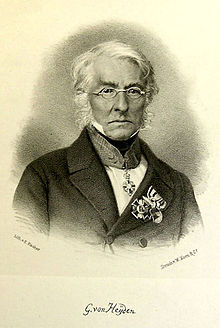Carl von Heyden
Carl Heinrich Georg von Heyden (born January 20, 1793 in Frankfurt am Main ; † January 7, 1866 there ) was a German politician and entomologist ( entomologist ).
life and work
Carl Heinrich Georg von Heyden came from a patrician family in Frankfurt who always held the post of director of the postal connection to Cologne between 1635 and 1748 . His father was Heinrich Dominicus von Heyden (1744-1819), his mother Luise von Cloz .
As was customary in the families of the Frankfurt upper class at the time, he received private lessons, among others from Johann Jacob Gottlieb Scherbius , who had already taught the young Johann Wolfgang von Goethe in Latin . From an early age he studied entomology , including through the extensive Johann Isaak von Gernings collections . From 1810 to 1812 he studied forest science at the Forest Academy in Drei 30acker near Meiningen , headed by Johann Matthäus Bechstein , and in 1813 at the University of Heidelberg , where he was a member of the Corps Rhenania . In 1814/15 he took part in the Wars of Liberation and then joined the line battalion as a first lieutenant , the regular military of the Free City of Frankfurt .
Heyden belonged to the Ganerbschaft Zum Frauenstein . In 1827 he became a senator and later a deputy at the War Weapons Office and the Forestry Office , which administered the Free City's extensive forest property. In 1836 he became the younger mayor . In 1837 he moved to the Schöffenbank , the first bank of the Senate, and in 1845 took over the office of Senior Mayor for the first time . He was re-elected in 1848, 1850 and 1853, so he led the fortunes of the city during the turbulent times of the March Revolution and the Frankfurt National Assembly .
As a politician, Heyden belonged to the conservative wing of the Senate. On October 20, 1851, Johann Philipp Herrlich carried out an assassination attempt on him, which, however, went off lightly. Heyden then withdrew more and more from politics and devoted himself exclusively to his research, especially about butterflies . He was a member of 35 scientific societies and associations, including - as a co-founder - since 1817 the Senckenberg Natural Research Society , whose entomological section he founded in 1821, the Society of German Natural Scientists and Doctors (1822), the Physical Society (1824), the Society for Geography and Statistics (1836) and the Society for Scientific Entertainment . He gained international recognition in 64 specialist publications, including 34 entomological publications. Three genera and 33 species of animals and plants are named after Heyden . 1861 awarded him Giessen University the honorary doctorate . Heyden was also a member of the Frankfurt Association for History and Archeology .
In 1837 he married Julia von Dörnberg (1815–1844), daughter of the chief hunter Freiherr Friedrich von Dörnberg (1781–1877), with whom he had two sons and a daughter. His older son Lucas von Heyden (1838–1915) was initially a Prussian officer, but retired from active service as a major and continued his father's entomological studies. His younger son Karl Hermann also became a Prussian officer. He is considered the founder of scientific phaleristics .
Carl Heinrich Georg von Heyden died on January 7, 1866. His grave is in the Frankfurt cemetery .
literature
- Elli Franz: Heyden, Carl v .. In: New German Biography (NDB). Volume 9, Duncker & Humblot, Berlin 1972, ISBN 3-428-00190-7 , p. 69 ( digitized version ).
- Wolfgang Klötzer (Hrsg.): Frankfurter Biographie . Personal history lexicon . First volume. A – L (= publications of the Frankfurt Historical Commission . Volume XIX , no. 1 ). Waldemar Kramer, Frankfurt am Main 1994, ISBN 3-7829-0444-3 .
- Heinrich Gustav Reichenbach : Heyden, Karl Heinrich Georg von . In: Allgemeine Deutsche Biographie (ADB). Volume 50, Duncker & Humblot, Leipzig 1905, p. 309 f.
- Gothaisches Genealogisches Taschenbuch der Briefadeligen Häuser , Justus Perthes Gotha 1909, pp. 336–338 (series), continued until 1939
See also
Web links
| personal data | |
|---|---|
| SURNAME | Heyden, Carl von |
| ALTERNATIVE NAMES | Heyden, Carl Heinrich Georg von (full name) |
| BRIEF DESCRIPTION | German politician and entomologist |
| DATE OF BIRTH | January 20, 1793 |
| PLACE OF BIRTH | Frankfurt am Main |
| DATE OF DEATH | January 7, 1866 |
| Place of death | Frankfurt am Main |

